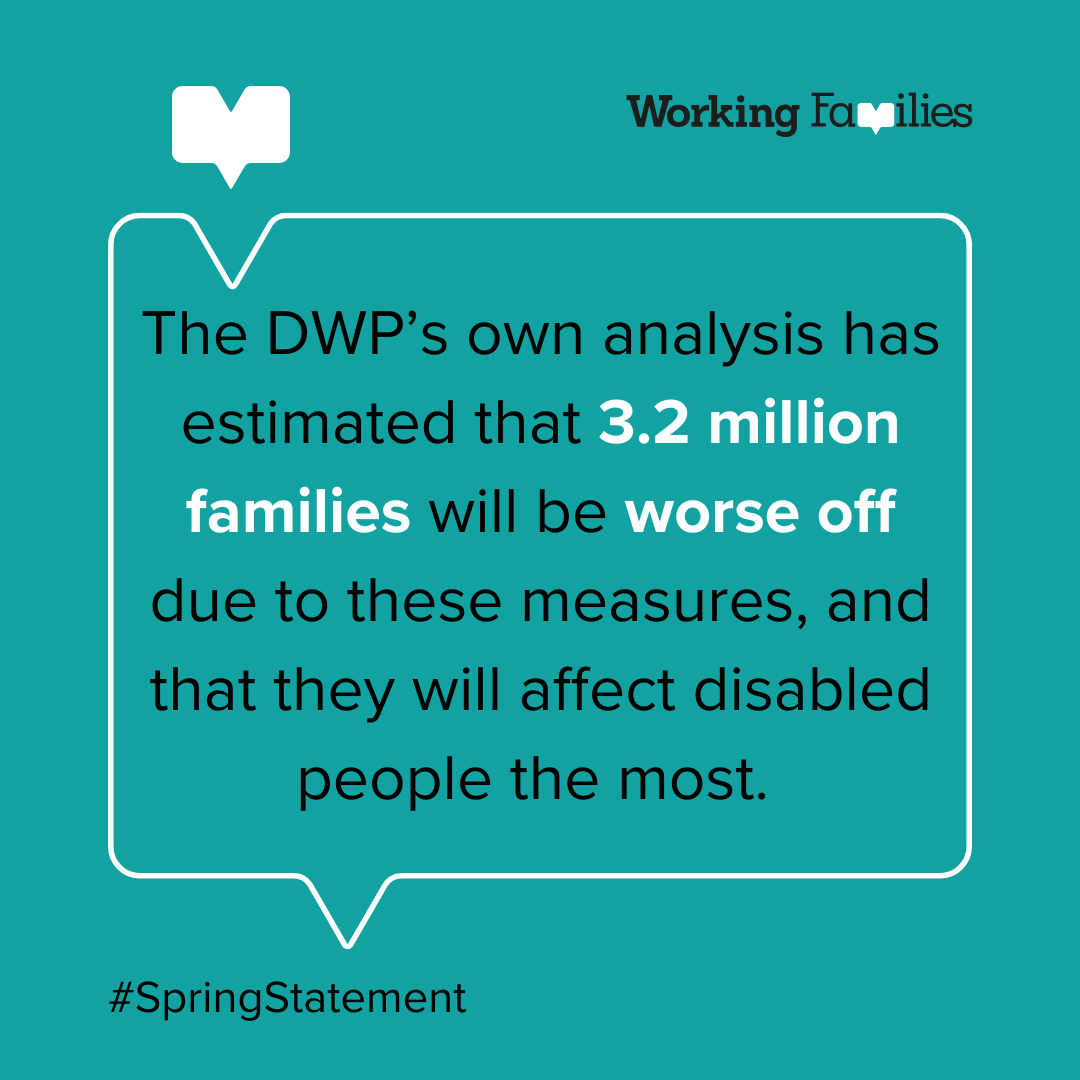Working Families’ Statement on the Chancellor’s Spring Statement Announcement
Published: 28 Mar 2025

As a charity that is working to remove barriers for parents and carers in the workplace, it is disappointing that the government has chosen to make cuts that will make it even more difficult for disabled parents and carers to stay in and enter work.
Whilst the government is demonstrating ambition and a joined-up approach in removing obstacles via the Employment Rights Bill such as expanding access to statutory sick pay and flexible working, the welfare cuts outlined in the Spring statement, specifically the proposed reforms to Personal Independence Payment (PIP) and the Work Capability Assessment (WCA) are not in line with this thinking. Instead, this will have a catastrophic impact on some of the country’s most vulnerable, pushing more people into poverty.
The DWP’s own analysis has estimated that 3.2 million families will be worse off due to these measures, and that they will affect disabled people the most. We are particularly concerned that 200,000 more people will be pushed into absolute poverty due to these measures, and 250,000 into relative poverty – this is in opposition to the Government’s work on the Child Poverty Taskforce.
While we understand the proposals are driven by the government’s vision to improve the system, the planned changes risk making it harder for disabled parents and carers to access the vital support—such as specialist equipment and transport—that enables them to work and live independently. Personal Independence Payments (PIP) are not linked to employment – so we are dismayed to hear the suggestion that benefits such as this disincentivise work. In Working Families’ experience, they are a facilitator for parents and carers to enter and stay in work.
The Government’s plans to encourage people into work through cuts to Universal Credit fail to consider that 40% of Universal Credit claimants are already in work, facing a daily battle to cope with the increase in the cost of living. Freezing Universal Credit health top-up for existing claimants, whilst significantly cutting it for new claimants, will result in a significant loss of £2,132 per year for the most vulnerable.
The Women’s Budget Group warns that losing the support PIP offers will increase carer needs, making it more likely that carers will need time off work. Already, 600 carers leave work every day due to caring responsibilities.
The government has demonstrated a progressive approach when promising investment to empower disabled people to access good quality jobs and we support the solutions laid out in the Green Paper, particularly the commitment to reviewing Access to Work to ensure it is fit for the modern workplace. However, reducing or cutting off vital support will not aid the journey for disabled people and carers into the workplace or enable them to stay there. As Prof. Ruth Patrick and Prof. Aaron Reeves have argued, these proposals risk solving the ‘wrong problem’.
The disability employment gap currently stands at 28.6%, and halving this gap would bring the government closer to its 80% employment target. Disabled people are disproportionately represented on insecure contracts, in lower-skilled jobs, or on low incomes. Without sufficient support to achieve access to better-paid, flexible, more stable employment there is a real risk that even more disabled parents and carers will be pushed out of employment.
We note that some of the proposed savings may be reinvested into employment support programmes. One key area for investment should be expanding the Flexible Support Fund to help parents and carers returning to work, particularly mothers returning from maternity leave who need childcare support. This would prevent families from falling into debt due to upfront childcare costs, aligning with the government’s goal of prioritising work over benefits.
Working Families is keen to work with the government to solve the right problem by creating more accessible work for disabled parents and carers1, and we welcome the opportunity to engage and explore ways to support the government’s objectives while ensuring that parents, carers, and disabled workers receive the support they need to enter, remain, and thrive in the workforce.